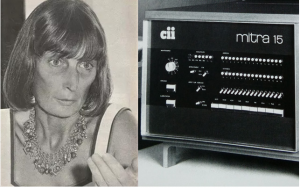Europe officially announced its second exascale system, Alice Recoque, and you can expect to see that name on the Top500 supercomputer list in a few years. Alice Recoque is the new name for a supercomputer with the operating name Jules Verne. The supercomputer is named after a celebrated French scientist and AI pioneer.
The supercomputer will cost about €544 million. It will be installed at CEA’s TGCC supercomputing center at Bruyères-le-Châtel, about 25 miles south of Paris. The Jules Verne consortium, which includes France’s GENCI and the Netherlands’ SURF, will operate the system.

Alice Recoque, a French engineer, worked at the SAE and CII. She notably led the Mitra15 project and was responsible for Research and Development of the “small computers” division. Later, she led the Bull Group at CII. In 1985, the Bull Group focused on research on highly parallel machines and artificial intelligence. (Source: https://mag.mo5.com)
Here’s what we know about the supercomputer:
– The EuroHPC JU hasn’t given a clear launch date, but other European tech agencies projected 2026 for the system to go live. However, based on past coverage, HPCwire expects the system to be fully operational in 2027 or 2028.
– Alice Recoque is Europe’s second exascale system after Jupiter, which is being installed in Germany and could go live in 2024 or next year.
– Europe has many goals with the second supercomputer. “We are looking around and trying to understand what level of ambition we can have there, but the aim is for the system … to have a further increase in European technology compared to what we managed to do in Jupiter,” said Anders Dam Jensen, executive director for the EuroHPC JU, during a presentation at ISC 2024.
– One native European technology will be SiPearl’s ARM-based Rhea-2 chip, which will succeed the Rhea-1 chip in Jupiter.
– The Rhea-1 chip is undergoing a redesign to include Samsung’s HBM memory, which wasn’t part of the original chip design. That has delayed the shipment date for the chip, and SiPearl could be simultaneously updating the Rhea-2 chip design, which may not affect its shipment date.
– Alice Recoque will be for AI and high-precision HPC.
– Like Jupiter, Alice Recoque has a modular design. A system with Rhea-2 CPUs will act as a nerve center onto which modules such as GPU-accelerated and quantum computing systems can be added.
– EuroHPC JU also wants to use accelerators developed by EPI (European Processor Initiative) such as EPAC, which is a RISC-V based vector accelerator.
– Europe is a reluctant backer of ARM-based CPUs but ultimately wants high-performance computers running on RISC-V chips. However, the Alice Recoque supercomputer proves that RISC-V isn’t ready for primetime in HPC.
– Atos will build the system, which will be geared towards generative AI, security, climate studies, and energy management, which are priorities in Europe.
– Europe has no plans yet for a third exascale system. EuroHPC JU leaders are instead focusing on “post-exascale systems”. Zettascale systems were never part of EuroHPC JU plans, and it seems they understand the technological limitations of exascale systems.
– EuroHPC JU is funneling more money into quantum computing systems, which will be installed at six computing sites. The organization also connects all 29 high-performance systems in Europe, including Lumi in Finland and Leonardo in Italy.
– Europe is also making significant upgrades to existing supercomputers. “We’re not standing still… we will start a very significant upgrade of the Leonardo system,” Dam Jensen said at ISC.
#AI/ML/DL #Datacenter #Slider:FrontPage #ARM #CEA #EPAC #EuroHPC #EuroHPCJU #GENCI #GPU #JulesVerneConsortium #JUPITER #Leonardo #LUMI #Rhea-1 #Rhea-2 #RISC-V #SURF [Source: EnterpriseAI]

